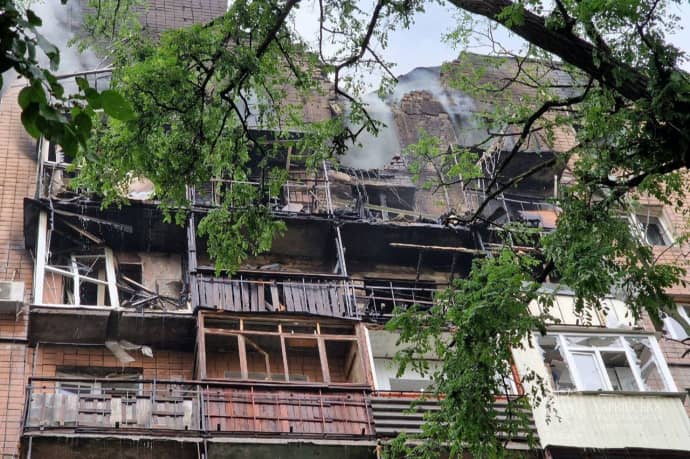Since the nationalization, the employees of British Steel still do not know whether their jobs are safe

A few men in work flun are sitting on them Full English Breakfast. In the Dandi’s Café, on the industrial estate right next to British Steel, they slide the last bites eggs, beans in tomato sauce and potato cookies on their fork. When they walk out later, they see the large cooling towers of the steel factory a few hundred meters away.
Debbie Malkin is the manager of Dandi’s and she tells how exciting in recent weeks have been here in Scunthorpe, a factory town in the middle of England. « The boys who came to eat here were wondering if they would still get their salary. » She also noticed that she had less run -up. « Customers stayed away because they were not sure if they would still have work next month. »
Last week, the Labor government took over control over British Steel from the Chinese steel company Jingye. The factory in Scunthorpe is the last of the United Kingdom that makes high -quality new steel, instead of circular steel from old scrap. But British steel suffered loss for years. In recent weeks it turned out that the Chinese owners wanted to cancel their orders for new raw materials and no longer made their payments. Jingye was planning to close the two blast furnaces.
Urgent legislation
The risk was real that the blast furnaces, once cooled, would no longer be able to get going. That is why the government decided for urgent legislation. The Lower House was recalled from the Easter recess and Minister of Trade Jonathan Reynolds took over the lead at British Steel. Last Tuesday, Minister Reynolds personally came to see how loads of coal were loaded in trucks in the harbor near Scunthorpe and drove to the factory. The blast furnaces could keep running.
Despite the first major relief, says Debbie Malkin, employees and other residents of Scunthorpe are still in uncertainty. The government now has the daily management of British Steel, but has not yet officially decided whether the factory will be nationalized and the government is therefore taking over the ownership of Jingye. Malkin: « Until it is definitely clear what happens, the prospect remains frightening for many. Somehow British Steel has to stay open, otherwise Scunthorpe will become a ghost city. We and many other companies should therefore close. »
The British Steel factory site is on the east side of Scunthorpe and is almost as long as the town itself. The local economy is largely dependent on the steel factory. Many small and medium -sized companies are part of the supply chain. In the heyday of British steel production in the sixties, nearly 26,000 people worked on the site. But technologies improved, machines replaced manpower and now there are still around 2,700 employees left. The factory supplies steel for, for example, railways, planes, football stadiums and large construction projects.
/s3/static.nrc.nl/images/gn4/stripped/data130953000-e8d5bb.jpg|https://images.nrc.nl/Ztn8BaxmHie60x1P3jDvakP1a2M=/1920x/filters:no_upscale()/s3/static.nrc.nl/images/gn4/stripped/data130953000-e8d5bb.jpg|https://images.nrc.nl/fimxZmNDLAycbD0tbeBdIF3FlLM=/5760x/filters:no_upscale()/s3/static.nrc.nl/images/gn4/stripped/data130953000-e8d5bb.jpg)
The problem for the government is that the steel factory has been losing for years. According to the current owner, that loss is even around 700,000 pounds (more than 840,000 euros) per day. Since privatization in the late 1980s, British Steel had a handful of owners, but none of them managed to make the factory structurally profitable. International competition is large and energy prices in England are much higher than in other countries. This big competition is also a problem for the Dutch factory of Tata Steel in IJmuiden: the owner announced a large dismissal round earlier this month.
Why does the British government make such a rescue attempt? Strategic and geopolitical considerations play a role. From an internationally, protectionist tendencies have become stronger in recent months after the re -election of Donald Trump in the US and the instability as a result. A ‘own’ production of new and strong steel see many countries as crucial for the safety of their inhabitants. Europe-wide, countries are going to spend more money on Defense again, on the production of tanks and ships.
Everything in China decided
Without British Steel, the United Kingdom would be the only country of the G7, a group of seven important industrialized countries, which would no longer produce high -quality steel. In those other G7 countries, the steel sector is relatively larger than in the UK. « It shows that we are missing something somewhere that we should do better, » said British minister Reynolds at the end of last year. Labor then dedicated 2.5 billion pounds (more than 3 billion euros) for investments in the steel industry. Of that money, the costs for the raw materials supplied this week are now paid in Scunthorpe.
Many employees hope and expect that the government will soon decide to nationalize British Steel and that Labor will find a private company willing to invest more to get the factory profitable again. « None of our owners made the investments that were needed in recent years. Now we have to show that we can make good quality steel here, to the government and the taxpayer, » says Ian Linklater. He worked for more than 25 years at one of the wals mills in Scunthorpe. Since a few months he has been a full -time representative of Community, the most important trade union in the steel industry.
Ian Linklater would rather not do too sour about Jingye, « because they kept us running for five years. » But management and decision -making were slow, he says. « We had the idea that all daily decisions were made in China. » And they had to work regularly with moderate quality Cokes, an important raw material for steel production. « Last year, that poor quality ensured that one of the two blast furnaces no longer worked well. The temperature fell too fast. It took four months to fix the oven. »
Labor may have prevented the end of British Steel for the time being, but the government has also committed itself to the aim of making British society climate neutral, with net no Co2-Ill.. Deadline is the year 2050. The steel industry is strongly polluting and is responsible for around 14 percent of the CO2-Illing of the manufacturing industry in the UK. Traditional blast furnaces emit much more harmful greenhouse gases than the new, electric ovens.
Nevertheless, Ian Linklater prefers to see the two blast furnaces stay open and that one or two electric ovens are added in Scunthorpe. Zeroso that net emissions are not given a priority for him. More importantly, he finds it that British Steel again receives enough orders for high -quality steel. « Who knows, there will be new technology on the market in the meantime, so that the blast furnaces can continue to run, but with fewer emissions. » Jingye already received a permit for the construction of an electric oven last year, but left those plans for what they were.
Four queens
Other residents of Scunthorpe also find sustainability less important than their local employment. « It’s good for the moral of Scunthorpe if the steel factory remains open, » says John Barber. “And very ambitious about zero Does not make sense if other countries do not participate in it. » With a friend, the fifties makes a walk through the most important shopping street. The ovens are once named after four British queens: Mary, Anne, Victoria and Elizabeth. Anne and Bess are still in office.
In your twenties, Barber also worked at British Steel, as a temporary worker he helped an electrician with chores. He thought it was fantastic. « The atmosphere was great, at the time it was bustling here. Everyone could find work at the factory if he wanted to. Although safety and health instructions were not much for it at the time. I was partly stopped because of the risks to your health. » After that, Barber worked as a postman for years. Now he is at home and waits for an operation on his foot so that he can return to work.
SCUNSHORRE is no longer particularly fierce. Barber shops, cheap drugstores, betting offices and closed windows alternate in the shopping street. The important role of British Steel for the town is still visible. Pubs have names such as Queen Bess, Smoke and Iron and the Iron Forge, the IJzersmederij.
At the local employment agency there are vacancies for tipping car drivers who have to drive loads of coal on the factory site, and for operational employees who can serve small cranes and fork lift trucks. Salary: converted between 16 and 22 euros per hour. In comparison with the rest of England, Scunthorpe has many practically trained workers and residents without qualifications. There are few managers and many people who serve machines and do living bandwork.
Nigel Farage is firing
The intervention of Labor to get the raw materials on time at British Steel and the emergency consultation in the Lower House last week were generally received positively in the British media and the trade unions. Within the party, members were delighted because after months of meaningless negotiations between the government and Jingye they could finally mean something for the employees and for the international industrial position of the UK. Labor has been in power for almost a year now, but since then the economy has hardly improved and the party has had few concrete moments of success.
/s3/static.nrc.nl/images/gn4/stripped/data130953040-e180f8.jpg|https://images.nrc.nl/6GirziXvIFM1MLHeu6GNJsc4G6w=/1920x/filters:no_upscale()/s3/static.nrc.nl/images/gn4/stripped/data130953040-e180f8.jpg|https://images.nrc.nl/RtrcqctJBr0aAW12OOwnCgjwSt0=/5760x/filters:no_upscale()/s3/static.nrc.nl/images/gn4/stripped/data130953040-e180f8.jpg)
John Barber likes that something has finally changed for British Steel. « Even if it took them for a long time. » Furthermore, he gives Labor little recognition for it – he doesn’t have much on with Labor or with the conservatives, the two largest political parties in Westminster. « Those politicians are all the same. They are in it for their self -interest. » Barber voted in July last year for Reform UK, the populist-right party of professional political rioter Nigel Farage. Farage also tried to heat around British Steel. He said that Jingye’s plans to close the factory were pure strategy of the Chinese people’s party. He did not have any evidence for that. « Call it intuition. »
In recent weeks, all kinds of rumors were about possible sabotage from Jingye. They wanted to sell Chinese steel under the British flag, they wanted to move the production from the British track to China, they would have showered all the wins to China. Minister Reynolds (Handel) said shortly after the decision to take control of British Steel that he would « no longer want a Chinese company in our steel sector. » He came back from that comment later. Labor tried in recent months to improve the relationship with China, because the UK can use investments in the economy well.
Within British politics, also within the Labor Government Party, there are now voting for a broader investigation into Chinese investments in sectors that are of strategic importance. Such as a lower house member of Labor against Dagblad The -Guardian said: « Economic security can no longer be a side issue. Some who invest here are looking for more than just profit – they are looking for power over our country. »

/s3/static.nrc.nl/wp-content/uploads/2025/06/07043854/ANP-426099410.jpg)
/s3/static.nrc.nl/images/gn4/stripped/data133212332-41b949.jpg)
:format(webp)/s3/static.nrc.nl/images/gn4/stripped/data133314127-765aec.jpg)




